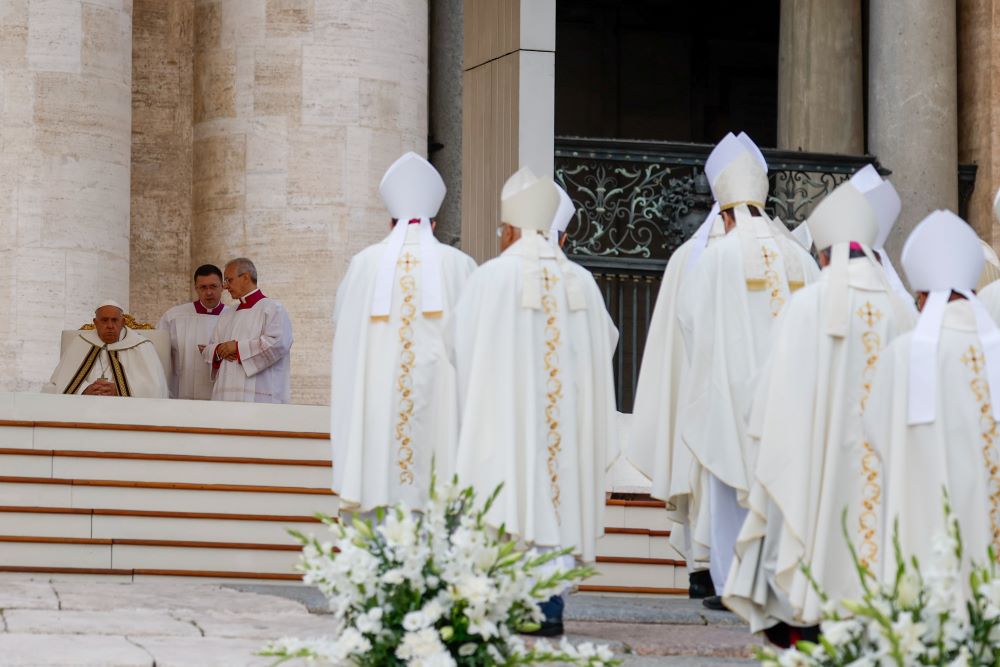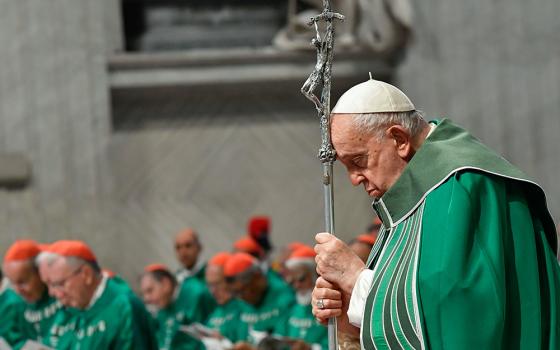
Bishops process toward the altar in St. Peter's Square during Mass with Pope Francis for the opening of the Synod of Bishops on synodality at the Vatican Oct. 2. (CNS/Lola Gomez)
Pope Francis on Oct. 2 opened the final session of a closely watched Vatican summit on the future of Catholicism, encouraging participants not to use the monthlong meeting to push individual agendas, but to seek unity in diversity in the church so "each person feels welcomed."
"Let us be careful not to see our contributions as points to defend at all costs or agendas to be imposed," Francis said during his homily for the opening Mass of the synod on synodality.
"Otherwise we will end up locking ourselves into dialogues among the deaf, where participants seek to advance their own causes or agendas without listening to others and, above all, without listening to the voice of the Lord," he continued.
Throughout the Oct. 2-27 synod, some 400 delegates from all over the world will meet here in Rome to bring to a close a yearslong consultation process Francis launched in 2021. It invited Catholics from around the world to have their say in how the church might become more inclusive and better at listening to all its members.
Millions of Catholics responded, and at last year's first session of the synod, the delegates — representing a wide array of views and backgrounds — engaged in intense and sometimes heated discussions on several contentious issues facing the church. They addressed issues including clergy abuse, the role of women in ministry, inclusion of LGBTQ Catholics and other questions surrounding church authority.
As the delegates reconvene, Francis has insisted that he doesn't want hot-button issues to dominate the event. Rather, he wants the assembly to focus on how the church's structures can encourage greater participation and to determine where there is room for "legitimate diversity" among local churches on different issues and practices.
"With the help of the Holy Spirit, we must listen to and understand these voices — that is, the ideas, the expectations, the proposals — so as to discern together the voice of God speaking to the church," Francis said at the opening Mass in St. Peter's Square.
'Those who arrogantly claim to have the exclusive right to hear the voice of the Lord cannot hear it.'
—Pope Francis
"For this to happen, however, there is a condition: we must free ourselves from everything that prevents the 'charity of the Spirit' from creating harmony in diversity in us and among us," he said.
"Those who arrogantly claim to have the exclusive right to hear the voice of the Lord cannot hear it," he cautioned.
Before the synod, delegates gathered for a two-day retreat led by Dominican Fr. Timothy Radcliffe, who encouraged synod members to think of the image of a fishing net, as Christ's disciples used in the Gospels.
"How can the church embrace all of the diverse cultures of our world? How can we haul in the net with its fish from every culture of the world? How can the net not be broken?," he asked.
"A net consists of empty holes linked together by ropes. Spaces and bonds," he said. "Without both, there would be no net to haul in the fish."
As the Mass began, that diversity was on full display as ecumenical delegates from other Christian traditions and lay delegates from all over the globe led the procession through St. Peter's Square, followed by the priests, bishops and cardinals. As they reached the altar, they were met by Francis, who arrived in the square via wheelchair.
The 87-year-old Francis, who has made synodality the centerpiece of his papacy and the primary vehicle for implementing church reforms, told those gathered under a partially sunny, but overcast October sky that the issues facing the synod are "great and delicate" and must be guided by humility and careful listening, but always seeking harmony.
Following the Mass, delegates headed into the synod assembly, where hierarchs and laity would again sit side-by-side at roundtables to begin their deliberations for the next four weeks.
Advertisement







